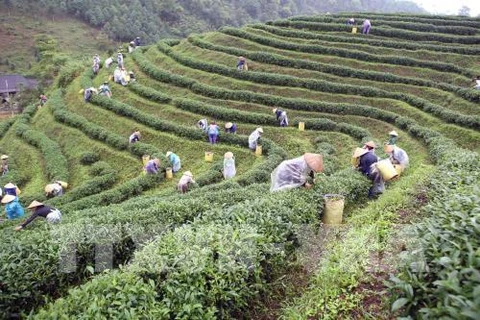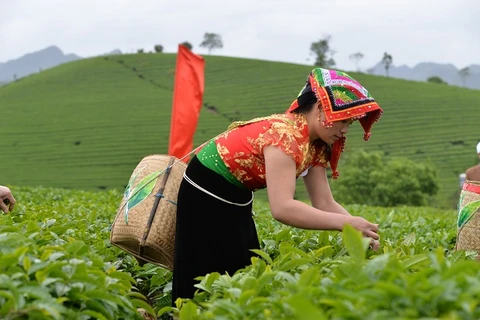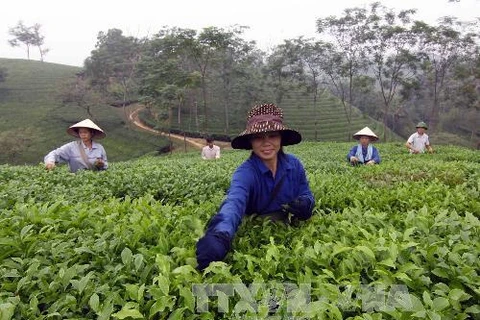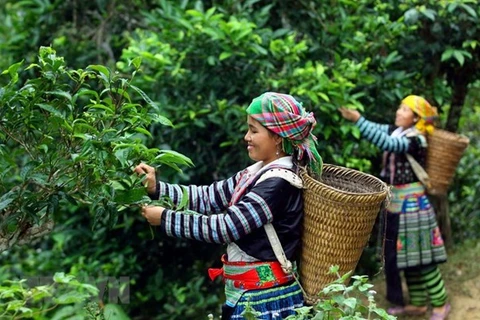Thai Nguyen (VNA) – Specialty tea grown in the northern province of Thai Nguyen has obtained collective trademark protection in the US, mainland China, Taiwan (China) and Russia, setting the scene for the product to gain a stronger foothold in the global market.
Thai Nguyen, located 75 km to the north of Hanoi, is home to the country’s largest tea growing area. The province is well-known for its green, aromatic and black teas. Tea plants have been grown in Thai Nguyen for around 100 years.
Currently, there are more than 22,600 hectares of tea cultivation in Thai Nguyen, with an average output of over 244,500 tonnes of fresh tea leaves each year. More than 80 percent of the local tea area is grown under VietGAP standards.
Last year, its tea production reached 5.58 trillion VND (242.3 million USD), accounting for 44.3 percent of the local agricultural value. The province earned around 270 million VND per hectare of tea in average.
Its tea products are largely consumed domestically, with just about 20 percent exported, mainly to China’s Taiwan, mainland China, Pakistan, Russia, the US, the UK, Afghanistan and Indonesia.
In the domestic market, local tea fetches 120,000 VND – 450,000 VND (5.2 – 19.56 USD per kg, some premium products can be even sold at up to 3 million VND (130.3 USD) per kg. Export prices, meanwhile, mainly range around 1.7 – 2 USD per kg as a majority of shipments are raw materials.
According to the Thai Nguyen Tea Association, the province exported more than 700 tonnes of dried bud tea in the first five months of 2021, and shipments of premium green tea products to demanding markets like Poland, Germany, the US and Japan are on a rise.
Thai Nguyen-branded tea has been favoured by domestic consumers for its unique aroma, said Nguyen Thi Nga, Chairman of the Thai Nguyen Tea Association, local producers have paid more attention on developing more attractive packaging designs and creating a wider range of products, from low-end to high-end. They should not be content with the domestic market only but target more foreign markets.
Export potential remains large for Thai Nguyen tea since there are increasing specialised areas for high-quality tea farming, Nga said, adding that the province has also adopted various policies to support growers and facilitate the growth of tea industry, in terms of input, trade promotion, market development, branding and others.
The association is developing a project for applying Blockchain technology in the management of Thai Nguyen tea production and origin traceability, she noted.
Duong Van Luong, Chairman of the provincial People’s Committee, said Thai Nguyen is accelerating use of information technology and digital transformation in agriculture, particularly tea cultivation and processing. It also hopes to lure more investment, from both domestic and foreign sources, into the industry in an effort to bring more high-quality and a wider range of products to the global market, he noted./.
Thai Nguyen, located 75 km to the north of Hanoi, is home to the country’s largest tea growing area. The province is well-known for its green, aromatic and black teas. Tea plants have been grown in Thai Nguyen for around 100 years.
Currently, there are more than 22,600 hectares of tea cultivation in Thai Nguyen, with an average output of over 244,500 tonnes of fresh tea leaves each year. More than 80 percent of the local tea area is grown under VietGAP standards.
Last year, its tea production reached 5.58 trillion VND (242.3 million USD), accounting for 44.3 percent of the local agricultural value. The province earned around 270 million VND per hectare of tea in average.
Its tea products are largely consumed domestically, with just about 20 percent exported, mainly to China’s Taiwan, mainland China, Pakistan, Russia, the US, the UK, Afghanistan and Indonesia.
In the domestic market, local tea fetches 120,000 VND – 450,000 VND (5.2 – 19.56 USD per kg, some premium products can be even sold at up to 3 million VND (130.3 USD) per kg. Export prices, meanwhile, mainly range around 1.7 – 2 USD per kg as a majority of shipments are raw materials.
According to the Thai Nguyen Tea Association, the province exported more than 700 tonnes of dried bud tea in the first five months of 2021, and shipments of premium green tea products to demanding markets like Poland, Germany, the US and Japan are on a rise.
Thai Nguyen-branded tea has been favoured by domestic consumers for its unique aroma, said Nguyen Thi Nga, Chairman of the Thai Nguyen Tea Association, local producers have paid more attention on developing more attractive packaging designs and creating a wider range of products, from low-end to high-end. They should not be content with the domestic market only but target more foreign markets.
Export potential remains large for Thai Nguyen tea since there are increasing specialised areas for high-quality tea farming, Nga said, adding that the province has also adopted various policies to support growers and facilitate the growth of tea industry, in terms of input, trade promotion, market development, branding and others.
The association is developing a project for applying Blockchain technology in the management of Thai Nguyen tea production and origin traceability, she noted.
Duong Van Luong, Chairman of the provincial People’s Committee, said Thai Nguyen is accelerating use of information technology and digital transformation in agriculture, particularly tea cultivation and processing. It also hopes to lure more investment, from both domestic and foreign sources, into the industry in an effort to bring more high-quality and a wider range of products to the global market, he noted./.
VNA


























